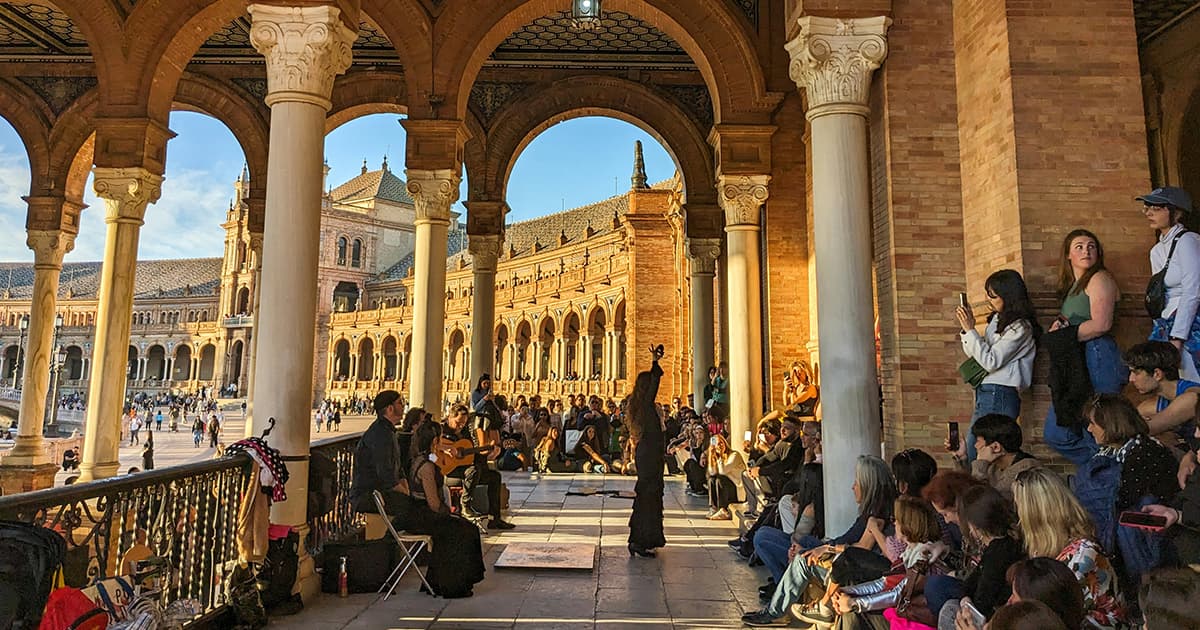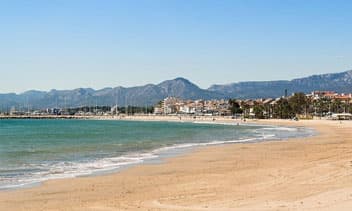
Non-Lucrative Visa or No Visa? The Best Choice for Long-Term Life in Spain
Last update: September 3, 2025
Reading time: 9.2 min
The non-lucrative visa offers several key advantages over not having a visa, especially for non-EU citizens who wish to live in Spain legally for an extended period. Without a visa, you are limited by short-term stay rules, whereas a non-lucrative visa opens up many more possibilities for legal residency. Here’s a detailed comparison of the non-lucrative visa versus no visa (i.e., staying in Spain as a tourist under the Schengen rules):
| Criteria
Click on the criteria to jump to the relevant section |
Without a Visa | With a Non-Lucrative Visa |
|---|---|---|
| Duration of Stay | 90 days within 180-day period | 1 year initially, renewable for 2-year periods |
| Legal Status | Tourist | Resident; no work in Spain allowed |
| Path to Residency | None | Possible after 5 years; eligible for citizenship after 10 years |
| Freedom of Movement | Limited by Schengen rules | Travel within Schengen for up to 90 days in any 180-day period |
| Access to Services | Limited; access to basic tourist services only | Full access to healthcare (private insurance required), banking, and housing |
| Stability and Lifestyle | Restricted by 90/180 rule; no long-term planning possible | Can live, integrate, and establish a home long-term |
| Tax Considerations | Not a tax resident (unless staying >183 days); taxes only on Spanish income | Tax resident if staying >183 days; taxes on worldwide income, benefits from double taxation treaties |
| Flexibility for Remote Workers | Short-term stay only; cannot work remotely for long-term | Can work remotely for foreign clients; no work for Spanish companies |
1. Duration of Stay
Without a Visa
If you’re a non-EU citizen, you can only stay in Spain (and the Schengen Area) for up to 90 days within a 180-day period as a tourist. This means you can spend a maximum of 3 months in Spain within a 6-month period, after which you must leave the Schengen Area for at least 90 days before returning.
With a Non-Lucrative Visa
This visa allows you to stay in Spain for up to 1 year initially, with the option to renew it for 2-year periods afterward. To renew, you must meet specific requirements, such as demonstrating continued financial stability and private health insurance. Eventually, after 5 years of continuous residency, you can apply for permanent residency. This gives you the freedom to live in Spain for extended periods without the constraints of the 90-day limit.
2. Legal Residency Status
Without a Visa
You are considered a tourist and cannot stay in Spain for longer than 90 days in a 180-day window. If you overstay, you may face fines, deportation, or even a ban on re-entry to Spain or the Schengen Area.
With a Non-Lucrative Visa
You are legally recognized as a resident of Spain, which means you can live in the country without the fear of overstaying or facing legal issues. You also receive a residency card (TIE), which makes it easier to access services such as healthcare, housing, and banking. Note that although you are a resident, you are not permitted to work for Spanish companies or engage in business activities within Spain.
3. Freedom of Movement
Without a Visa
As a tourist, you are restricted by the 90/180 rule, and you must carefully plan your travel across Schengen countries. You can travel freely within the Schengen Area during your 90-day stay, but you must leave the entire area after your 90 days expire.
With a Non-Lucrative Visa
You are granted long-term residency, allowing you to live freely in Spain and travel within the Schengen Area for up to 90 days within any 180-day period without additional visas. This means you can use Spain as a base while enjoying short trips around Europe. However, it is important to ensure compliance with the travel limitations imposed by the Schengen rules.
4. Pathway to Permanent Residency
Without a Visa
Tourists do not have a pathway to permanent residency or citizenship in Spain. You are limited to temporary visits and cannot accumulate the required residency time to apply for permanent status.
With a Non-Lucrative Visa
The non-lucrative visa offers a clear path to permanent residency. After 5 years of continuous residency, you can apply for permanent residence, which gives you the right to live in Spain indefinitely. However, you must not leave Spain for more than 10 months within those 5 years. After 10 years, you may even be eligible for Spanish citizenship.
Without a Visa
As a tourist, your access to services is limited. You may struggle to open a bank account, sign a long-term lease, or register for local services like healthcare. Many service providers require proof of legal residency, which you cannot provide without a visa.
With a Non-Lucrative Visa
As a resident, you can register for local services, including Spain’s public healthcare system (if you contribute to it or have private insurance), open a bank account, and sign long-term rental contracts. Note that holders of the non-lucrative visa are generally required to have private health insurance, as they may not have automatic access to the public healthcare system.
6. Stability and Lifestyle
Without a Visa
Your time in Spain is restricted, and you need to carefully plan around the Schengen rules. This lack of stability can make it difficult to establish a routine, integrate into the local community, or enjoy the full benefits of life in Spain.
With a Non-Lucrative Visa
You have the stability of knowing you can stay in Spain for a year (or longer with renewals) without needing to leave. This allows you to fully immerse yourself in the culture, establish a home, and enjoy the lifestyle at your own pace. However, remember that while you can stay long-term, you cannot take up employment within Spain.
7. Tax Considerations
Without a Visa
As a tourist, you are not a tax resident of Spain unless you stay beyond 183 days in a calendar year. You are only liable for taxes on Spanish-sourced income, if any.
With a Non-Lucrative Visa
If you stay in Spain for more than 183 days in a year, you become a tax resident and are subject to Spanish taxes on your worldwide income. This can result in a higher tax obligation, depending on your global income. However, Spain has double taxation treaties with many countries, which can help prevent being taxed twice on the same income. Additionally, as a tax resident, you may gain access to local services and social security if you contribute to the system.
8. Flexibility for Remote Workers (Digital Nomads)
Without a Visa
You can stay for short periods, but staying long-term to work remotely from Spain isn’t feasible without proper residency. You are also not allowed to work or establish a business while on a tourist visa.
With a Non-Lucrative Visa
While the visa doesn’t allow you to work for Spanish companies or conduct business in Spain, it does allow you to work remotely for foreign clients or employers. This makes it a viable option for digital nomads who earn their income from outside Spain and want to live in the country long-term. However, make sure that your remote work is strictly for clients or employers outside Spain to comply with the visa conditions.
Why Get a Non-Lucrative Visa Instead of Staying Without a Visa?
The non-lucrative visa is a great option if you want to live in Spain long-term, whether for lifestyle reasons, remote work, or as part of a plan for permanent residency. While it comes with tax obligations if you stay over 183 days, the legal residency status and lifestyle benefits often outweigh these concerns, especially for those looking to immerse themselves in Spanish life. However, it is crucial to be aware of the limitations, especially regarding employment and healthcare access.
FAQs
What is a Non-Lucrative Visa for Spain?
The non-lucrative visa is a long-term residency visa that allows non-EU citizens to live in Spain without engaging in any professional or commercial activity. It provides a legal way to stay in Spain for more than the 90-day limit imposed on tourists and offers a pathway to permanent residency after 5 years.
Can I work in Spain with a Non-Lucrative Visa?
No, you cannot work for Spanish companies or engage in business activities within Spain on a non-lucrative visa. However, you are allowed to work remotely for foreign clients or employers, making it a suitable option for digital nomads who earn income from sources outside Spain. Keep in mind that all work must be conducted for foreign entities only.
How long can I stay in Spain with a Non-Lucrative Visa?
The non-lucrative visa allows you to stay in Spain for up to one year initially. After the first year, it can be renewed for two-year periods, provided you meet the renewal requirements, such as maintaining financial stability and private health insurance. After five years of continuous residency, you can apply for permanent residency, and after 10 years, you may become eligible for Spanish citizenship.
What are the financial requirements for obtaining a Non-Lucrative Visa?
You must demonstrate that you have sufficient financial means to support yourself without working in Spain. The exact amount varies, but generally, you need to show a minimum income or savings that cover at least 400% of the IPREM (Indicador Público de Renta de Efectos Múltiples), which is a standard financial measure used in Spain. These funds must be available to you for the entire duration of your stay.
Do I need health insurance for a Non-Lucrative Visa?
Yes, you are required to have private health insurance with full coverage in Spain. The insurance must be from a Spanish provider or an international provider that operates in Spain. This is to ensure that you have access to healthcare without relying on the public system. The policy must cover the entire period of your stay and include comprehensive healthcare services, including hospitalization.
Can I travel within the Schengen Area with a Non-Lucrative Visa?
Yes, having a non-lucrative visa allows you to travel within the Schengen Area for up to 90 days within any 180-day period. This means you can use Spain as a base while taking short trips to other Schengen countries without needing additional visas. However, you must ensure that your travel complies with Schengen rules, and your primary residence must remain in Spain.
What happens if I stay in Spain for more than 183 days in a year?
If you stay in Spain for more than 183 days in a calendar year, you become a tax resident and are subject to Spanish taxes on your worldwide income. Spain has double taxation treaties with many countries, which can help avoid being taxed twice on the same income. Becoming a tax resident may also grant you access to local services and social security benefits if you make contributions to the system.
What happens if I want to leave Spain for an extended period while on a Non-Lucrative Visa?
If you plan to leave Spain for an extended period, be mindful that maintaining your non-lucrative visa and eligibility for permanent residency requires continuous residency in Spain. If you are absent for more than 10 months over the course of 5 years, this may affect your eligibility for permanent residency.









